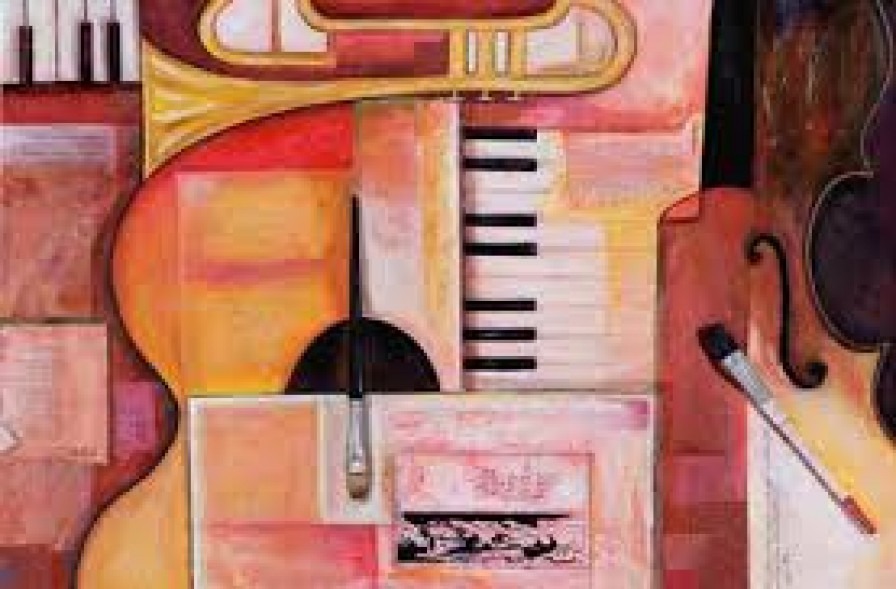Are Art and Music so different?

“Art happens unexpectedly. No one expected the British artists of Emin’s generation to become famous like they did – least of all, I suspect, their art teachers. As a school subject, art is a tricky one. Is it a serious attempt to nurture artists, or a soft subject? Everyone has memories of sticking straws together at primary school.”
I don’t remember straws at school. The Art Department at my secondary school was always the “other”; a remote and special room by the time you were in the sixth form and a sanctuary from the rest of school life. Prior to sixth form the art rooms (two large rooms with a storage room inbetween them) were my artistic home and they were notoriously messy and full of activity. The Art teachers were wonderfully passionate and dynamic and gave plenty of time between lessons to introduce interesting art objects as well as give additional assistance. I thrived on painting and cultivated the sketchbook practice of collecting anything that might be inspiration. It was apparent early on in Art that works took time to produce and the research phase was a lengthy one, and an individualized one; I would explore my own interests and any technical matters (such as to do with medium) would be discussed as we went. I don’t recall any didactic teaching of the whole class. I recall a community of individuals – particularly in the sixth form – that were able to pursue interests and create art we felt ownership of.
I found a report (https://www.nfer.ac.uk/nfer/publications/VAL01/VAL01.pdf ) about Art in the secondary schools from 2004. It ‘presents the findings from a year long study designed to ascertain the content of the art curriculum at key stage 3 and 4, with particular reference to the inclusion of contemporary art practice’. ‘In total, 54 art teaching staff were interviewed. They were questioned about curriculum design and content, and their perceptions of the factors affecting curriculum choice. Their perceptions of the outcomes of the art curriculum in their schools were also elicited’. Interestingly it was identified in this report that Art teachers in schools that identified as using contemporary art practices (CAP) had staff who ‘were more likely to have worked as professional artists before entering teaching, and thus may be able to share a more thorough understanding of the art production process with their pupils’. They also noted there was a scarcity in courses for Art teachers on art or teaching, but CPD on assessment was a common occurrence. Interestingly ‘in describing their curriculum approach, heads of department in CAP identified schools were more likely to focus on pupil experience, the importance of ideas, current events and external stimuli (such as gallery exhibitions)’. This report is now ten years old but it was republished as an online document in 2012.
The report was interested in the content of the Art curriculum: ‘There was a general consensus that, within the [“school art”] literature, time limitations were causing the arts to be taught through knowledge and skills-based approaches, with the distinct possibility that more conceptual approaches and notions of creativity were being neglected. Something that stuck in my mind from the section on the interviews with the head of department: ‘the interviewees were asked whether or not they viewed themselves as practising artists at the time of interview. There was a general consensus that, despite a desire to continue working as an artist, the pressures of teaching left the interviewees with little time to explore this, particularly for full-time members of staff and those with young children. A number of interviewees commented that the majority of their energy and artistic creativity went into helping their pupils achieve’. It goes on to mention that ‘despite these time constraints it was recognised that maintaining an interest in producing art, outside of school, was beneficial for teachers wishing to continually develop their areas of expertise and interest and was also beneficial for the pupils’. How many music teachers keep up with their own musical interests or have these been marginalized due to school workloads? Do Music teachers perceive themselves as ‘musicians’?
You can read the rest of this fascinating article by Steve Berryman and contribute to the discussion at:
https://teachtalkmusic.wordpress.com/2015/08/03/are-art-and-music-so-dif...
